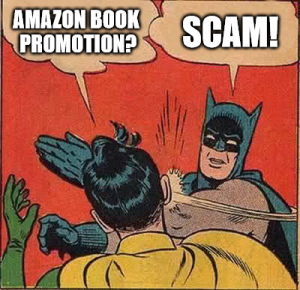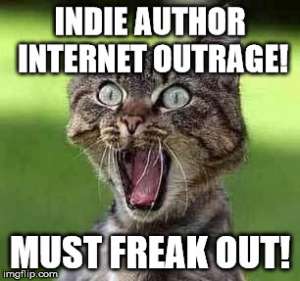 This is the first in a series on author internet outrage and Amazon adventure by Cate Baum.
This is the first in a series on author internet outrage and Amazon adventure by Cate Baum.
There’s been a fair amount of internet hysteria lately regarding Amazon’s court cases against authors, and confusion about getting book reviews through promotional services. Here’s how to tell what’s acceptable, and what’s not, and the truth about those court cases.
First, let’s start with what book promotion techniques are acceptable to Amazon.
What’s OK
1. Using promotional services that promote to reader lists
Examples: BookBub, SPR’s Kindle Promotion Packages, BookGorilla.
Why is this OK?
A UK or US-based service that has built qualified readers in a maintained list or book club means these readers will get info on books in the genres they like. To promote your book via email or ads is perfectly acceptable, because you yourself do not have any relationship with the reader and therefore any review is going to be impartial. There is no pressure on the readers to buy the book, therefore this is simply an advertisement to targeted audiences. Amazon actively encourages book promotion of this sort, and welcomes sales and reviews garnered by using genuine methods. This is one of the most cost-effective methods at around $5 – 7 a sale/review, and because lists are maintained the hit rate for reviews is very high.
Warning: There are some services that are not transparent about how they get your book sold. Be very aware of services that seem too good to be true in cost or what they promise. Make sure they have transparency about their methods, FAQs, and testimonials available. Reviews should be a result of a sale if genuine, so all reviews would have to be verified to be safe.
2. Using Paid Ads
Examples: Google, Amazon, Goodreads, Facebook
Why is this OK?
Buying an ad for your book that can attract readers and reviewers to your book page is a good way to get your book seen, but it’s certainly not as cost effective as using a mailing list service. It can be nice to see your book ad appearing on these sites alongside similar titles. Obviously, you have no control over who might read and review your book, so this is an entirely acceptable method with no restrictions on content, and you can buy direct from the site without third-party services.
Warning: This is an expensive way of getting your book seen, at about $20-40 a sale, that is if the buyer actually decides to buy once they reach the page, which is not guaranteed. So you may end up paying for clicks to your page without any sales or reviews.
3. Editorial Reviews
Examples: Kirkus, BlueInk, Self-Publishing Review, Midwest Review
Why is this OK?
Amazon loves Editorial Reviews. Yes, say it again to yourself. Editorial Reviews have nothing to do with Customer Reviews or Paid Reviews *see below*. These reviews are for your back of book, or to insert into the Author Central section Amazon provides especially for your book’s reviews, called “Editorial Reviews.” These reviews are given a lot of visibility by Amazon, and appear higher up than Customer Reviews on your book page, “above the fold“. That’s how important Amazon thinks they are – use this neat free page analyzer from Overgrowth to find out your score.
Professional reviews can give you kudos on your book page in a way customer reviews do not, and give you editorial copy to quote in publicity and on the back of your book to encourage sales. Amazon values these as part of an overall ‘good practice’ quality score for your book page. The more sections you fill out with solid content the better.
Warning: Use a well-known service that has a full press page and testimonials, with qualified staff who have lots of experience in reviewing books. A renowned site can be credited by company name, not a person nobody has heard of, i.e. “Polly Smithers” is no good, you need “Kirkus,” “SPR” etc.

Not all book promotion is a scam
What’s NOT OK
1. Buying KENP page reads or KU Borrows
There is a swarm of dodgy outfits, often in Asia or the Ukraine, offering to give you a huge amount of page reads or Kindle Unlimited Borrows, so that authors can manipulate ranking and take home a share of the KDP Global Fund.
Why is this not OK?
This is the method that Amazon is tearing down in court. Authors are being sued for manipulation for getting thousands of fake borrows and reads. This sabotages the real ranking status and deprives other authors of their share of the KDP Global Fund. Some authors have had a terrible time because they used these services without understanding what it meant to use services that advertised page reads, only to find out they have acted illegally against Amazon’s terms because of how it affects shared money paid out (Before you get that pitchfork out however, most authors that have fallen foul of this have only made a hundred bucks or less in fake page reads).
Warning: Most of these services, such as www.boostebook.com (now defunct) unfortunately run in faraway countries such as India and the Philippines by huge call-center style environments. This means it’s easy for the people running these services to ruin your book with shadowy methods and then shut down, leaving authors with no recourse.
Make sure you use services based in the US or UK, with proper front-facing websites that use PayPal so that you have customer protection. Make sure these sites have a privacy policy and terms and conditions, with plenty of info on how they operate and who they are.
2. Buying bot sales
There have been very shady dealings where young upstart entrepreneurial gurus have sprung several websites promising to sell thousands of books for you. Unfortunately some of these people have ended up getting a foothold in the “trusted expert” field. They will do what it says on the tin, but they use offshore companies in Asia, China, or Russia to use something called a “macro” that runs in a loop, quickly buying or borrowing loads of books. This is what Amazon have referred to as a “clickfarm.” It’s not really a clickfarm, it’s something else, but it’s the same principal, i.e. fake automated actions on your book.
Why is this not OK?
Using a service like this means you are manipulating the Amazon ranking system. This is not okay for Amazon because they end up paying out for page reads that actually didn’t happen.
Warning: These services are even run by seemingly legit “self-publishing gurus”. Not naming names, (boy, I wish I could) but one story tells of indie author Tim I. Gurung, who found himself being sabotaged by angry authors after taking advice from a very well-known indie author and blogger. He had inadvertently stumbled onto a bot service in good faith. His books, only written to finance an orphanage in Nepal, have now been under attack with negative reviews, specifically cutting off funds to orphans – all due to the hate campaign started against him in the name of “integrity.” I have no words…If you want to go buy a book and help, you can do so here.
Basically, services that offer numbers over about 200 a month in sales are more than likely using bots to do so. The reason I know this is because I know how much effort it takes, and how big a mailing list you need to achieve our numbers legitimately.
Although Amazon don’t care that much about this one so much because it means they are selling books, and you may therefore get away with it, it is still very inadvisable to do this because of how it makes your book look to others.
3. Buying paid review services
Examples: Fiverr, Craigslist, Upwork
Why is this not OK?
When you hear people talking about “paid reviews” this is exactly what they are talking about. Paid reviews are when you directly pay a reviewer to leave a customer review *NOT an Editorial* on your book page, usually without buying your book first. Therefore, the review with be “unverified” i.e. unpurchased, and will be entirely fake. These reviews are often cut and pasted in badly written English, and may repeatedly be used across Amazon.
Warning: This is the best way to get flagged by Amazon. Not only will the review be removed, but the reviewer’s profile will more than likely be deleted without warning. Your book may be eliminated from Amazon ranking. It’s not likely you’d be sued, but these sorts of reviews are really obvious and will make your book look spammy.
4. Leaving negative fake reviews for competitors
When the stories of KU fake borrows and reads broke, it was because several authors had climbed high in ranking using these shady methods. As a result, a horde of haters descended on these books and started leaving one-star reviews on those book pages, and down voting positive reviews.
Why is this not OK?
Apart from being totally unacceptable and against Amazons terms (see paid reviews) come on, people! This is such a nasty, childish way forward. Indie authors should be supporting each other, not hating on each other! In future, here’s hoping authors will sympathize with each other getting caught out, and help educate each other about promotion methods instead.
Things to Remember
- Not every service is a “scam”. Remember the definition of a scam is someone who runs off with your money without providing a service, not all book promotion.
- US or UK-based services are usually OK, as long as they have all the info about them on their website.
- Sales-only services over about 200 sales are probably bot-run, so avoid these, even if they seem legit.
- Only buy services that offer the chance of Verified Reviews. Unverified reviews suggest bots or fake buyers, and it’s just more vulnerable in general.
- Free book promotions are more likely to flag your book to Amazon
- Any “guaranteed” positive review services are against Amazon’s Terms of Service.
- Testimonials, a Privacy Policy, and PayPal payment method are all a good sign of transparency
- Don’t be afraid of asking questions. Any genuine service will give you answers.
- Don’t be ashamed of promoting your book with paid services! As long as you use professional services responsibly, you will keep in line with Amazon Terms, and can look forward to book success.
- Don’t go hating on others who have made a mistake. Not everyone is internet savvy, and you could cause real damage to people’s lives. Instead, write privately to the author, and point out their error.
And finally, remember that the authors being sued by Amazon knowingly used fake accounts, links, and paid reviews repeatedly, despite many warnings from Amazon beforehand. All of the papers released have shown multiple offenses over many books, with thousands of reviews faked.
While that obviously doesn’t mean you can go ahead with your fakery, it does mean that if you do get caught out with a bad service, you really shouldn’t worry about it too much in the grand scheme of things. With around 5 million books on KDP, and only 1000 cases in three years, it seems pretty clear cut who Amazon wants to sue. It’s probably not you.
Next time: An Exclusive Interview with Kayl Karadjian, author of Dragonsoul, on how his bestseller experience went horribly wrong and why.
Get an Editorial Review | Get Amazon Sales & Reviews | Get Edited | Get Beta Readers | Enter the SPR Book Awards | Other Marketing Services























Leave A Comment